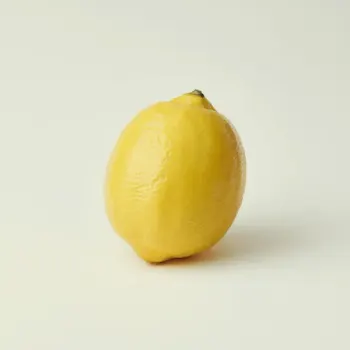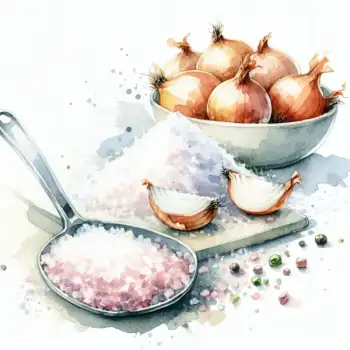Salt is a pure mineral essential for seasoning and preserving food, while onion salt is a blend of salt and onion powder used to add a combination of saltiness and onion flavor to various dishes.

Salt, a mineral composed primarily of sodium chloride, is a fundamental seasoning used to enhance the flavor of foods. It is a staple in kitchens worldwide and serves various purposes in cooking, including preservation, fermentation, and flavor enhancement.

Onion salt is a seasoning blend that combines salt with onion powder. It adds both the sharpness of salt and the sweet, pungent flavor of onion to dishes. It's commonly used in spice mixes, dry rubs, and as a tabletop condiment.
The primary difference between salt and onion salt lies in their flavor profiles and composition. Salt is pure sodium chloride, while onion salt is a blend that includes onion powder, providing a distinct onion aroma and taste. The texture of onion salt is also slightly coarser due to the addition of dried onion.

Your ultimate Recipe Box, Meal Planner, and Cooking Class all in one
Salt is used in an endless array of seasoning blends to balance and bring out the flavors of the other spices. It's versatile and can be used in everything from barbecue rubs to herbes de Provence. Onion salt is best used in blends where an onion flavor is desired. It's excellent in burger seasonings, vegetable dips, and savory snack mixes. Use onion salt to add a quick, all-in-one onion flavor and salinity.
Salt is critical for meat preparations. It's used in brines, marinades, and as a finishing touch to enhance the natural flavor of meats. It also aids in moisture retention and tenderizing muscle fibers. Onion salt can be used to season meats that pair well with onion flavors, such as pork or chicken. It's convenient for creating a simple yet flavorful rub or for seasoning ground meat mixtures like meatballs or meatloaf.
In vegetable dishes, salt is indispensable. It can elevate the natural sweetness of vegetables through roasting or sautéing and is also essential in blanching water to maintain the vibrant color and flavor of vegetables. Onion salt can add a savory depth to vegetable dishes, especially when paired with root vegetables or incorporated into vegetable casseroles and stir-fries. It brings a subtle onion note that complements the earthiness of many vegetables.
Salt is pure sodium chloride and contributes to your daily sodium intake, while onion salt contains additional ingredients like onion powder and anti-caking agents.
| Nutrient | Salt ( per Teaspoon ) | Onion Salt ( per Teaspoon ) |
|---|---|---|
| Sodium | 2325mg | 1680mg |
| Calories | 0 | 5 |
Yes, you can use onion salt to replace regular salt, but you may need to adjust the amount used due to the difference in sodium content and to account for the additional onion flavor.
Onion salt is not necessarily healthier than regular salt. Both should be used in moderation as part of a balanced diet.
Mix 3 parts salt with 1 part onion powder to make your own onion salt. Adjust the ratio according to your taste preference.
Onion salt has a noticeable but not overpowering onion flavor. It is designed to complement dishes with both saltiness and a hint of onion.
Store onion salt in a cool, dry place away from moisture and light to prevent clumping and preserve its flavor.